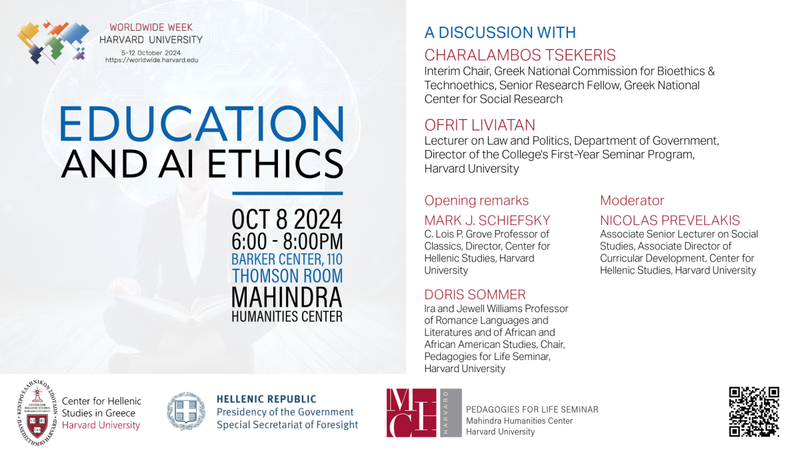Date: Tuesday, October 8, 2024
Time: 6:00 p.m. – 8:00 p.m. EDT
Location: Harvard’s Mahindra Humanities Center
Barker Center 110, Thompson Room, 12 Quincy Street, Cambridge, MA 02138.
Please join us in Cambridge on Tuesday, October 8 for a discussion on Education and AI Ethics as part of Worldwide Week at Harvard University. The event is open to all, with a reception to follow.
Over the past few years, the use of AI across all levels of education has rapidly grown, especially through the introduction of intelligent tutoring systems. The responsible implementation of AI in school education is the subject of the latest Opinion issued by the Greek National Commission for Bioethics & Technoethics. Under the prism of digital ethics, this implementation should not be guided by technical or technological visions without value depth but rather be grounded on foundational concepts of pedagogy and education. In addition, it should not remain restricted to technical elements; it must demonstrably expand learners’ skillsets and social interactions, protect their privacy, cultivate a future mindset and a sense of purpose, and foster their moral development as people. Eventually, the use of AI in education must promote equity and inclusiveness, fairness and justice, champion augmentation over automation, and reinvention over repetition.
Organized by The Center for Hellenic Studies in Greece and the US, the Special Secretariat of Foresight of the Hellenic Republic, and the Mahindra Humanities Center at Harvard Pedagogies for Life Seminar.
Speakers
Charalambos Tsekeris is Senior Research Fellow in Digital Sociology at the Institute of Social Research, Greek National Center for Social Research; and Visiting Professor at the University of Athens. He currently serves as Interim Chair of the Greek National Commission for Bioethics & Technoethics; Full Member of the Greek National Commission for Human Rights; Member of the OECD Expert Group on AI Futures; and Member of the Greek Prime Minister’s High-Level Advisory Committee on Artificial Intelligence. His research focus is on the Sociology of the Internet, with specialization in digital social research and the ethics of Artificial Intelligence. He has previously served as an External Scientist at ETH Zürich and as a Professor Extraordinary at the School of Public Leadership, Stellenbosch University. Currently, he holds the position of Research Associate at the Anti-Corruption Centre for Education and Research (Stellenbosch). He coordinates the World Internet Project-Greece, which examines the use of new technologies in Greece, and has taught at numerous academic institutions and study programs in Greece and abroad. He actively collaborates with the Special Secretariat of Foresight (Presidency of the Government, Hellenic Republic).
Ofrit Liviatan is a lecturer on law and politics at Harvard University’s Department of Government and the Director of Harvard College’s First-Year Seminar Program. Her publications, research, and teaching interests focus on the intersection of law and politics, including: the function of legal systems in divided societies, the role of legal mechanisms in accommodating diversity, sociolegal dilemmas around artificial intelligence, critical investigations of law through visual and literary frames, and the legal dynamics between religion and state. She is also the author of the political novel Anything But Steady.

